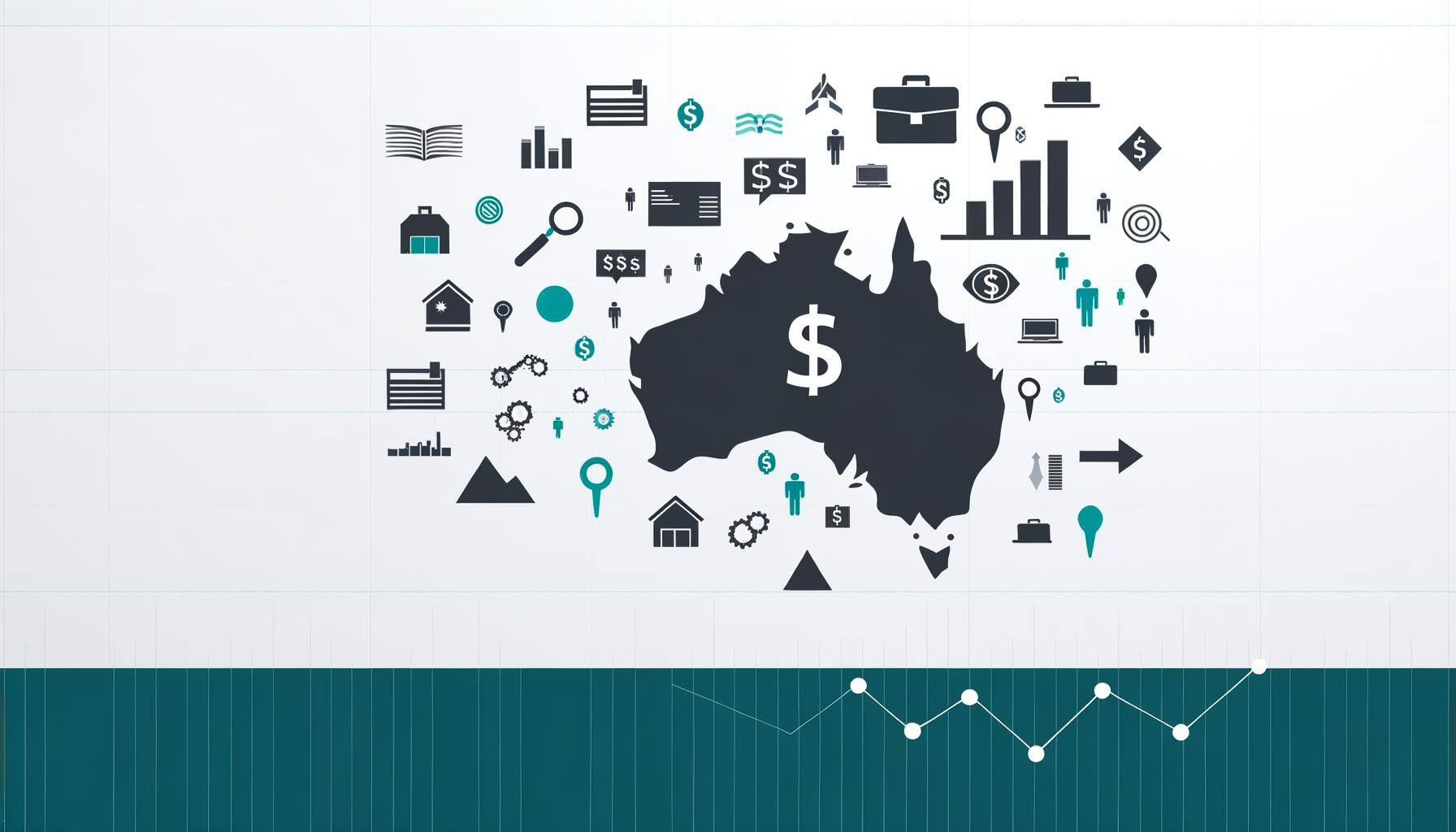ASX 200 Dips Slightly as Property Sector Struggles
As of 11:23am AEST on Friday, 5 July 2024, the Australian share market is experiencing a minor setback. The ASX 200 index has slipped 0.1 per cent to 7824.7 points, with the property sector taking the biggest hit.
Key Points:
- ASX 200 down 0.1%
- Property sector weakest performer
- Australian dollar trading at US67.27c
Despite the overall market decline, several sectors are showing resilience. Investors are closely monitoring the property sector's performance, as it continues to face challenges in the current economic climate.
"While the dip is minor, it's important for investors to keep an eye on sector-specific trends, particularly in property," says market analyst Jane Smith.
The Australian dollar is holding steady, trading near US67.27c. This relative stability in the currency market provides some reassurance to international investors and traders.
As the trading day progresses, market watchers will be keen to see if the ASX 200 can recover its early losses and if the property sector can bounce back from its current slump.
Stay tuned for further updates on the Australian share market and currency movements throughout the day.
Coal Mine Disruptions Spark ASX Mining Stock Rally
As of 5 July 2024, recent disruptions at two major coal operations have ignited concerns about supply shortages, leading to a surge in ASX-listed mining stocks. Underground fires at Anglo-American's Grosvenor mine in Queensland and Allegheny Metallurgical's Longview mine in West Virginia have interrupted production, affecting about 2.5% of the hard coking coal export market.
Market Impact
The incidents caused Australian coking coal futures to spike by 12% to US$261 per tonne this week, settling at US$245.50 on Friday. This price surge has fuelled a rally in coal stocks, with Whitehaven Coal and Yancoal experiencing significant gains of 16.7% and 9.7% respectively, reaching fresh 52-week highs.
"We see a near-term opportunity in coking coal, especially after the recent share price pullback," said Morgan Stanley analyst Sara Chan.
Future Outlook
Morgan Stanley predicts coking coal prices will climb another 15% by year-end, reaching US$290 per tonne. This forecast is based on an expected rebound in Indian demand and underappreciated supply constraints in China. Despite initial expectations of increased Australian supply, exports have disappointed due to adverse weather and other factors.
Investment Opportunities
Analysts view Yancoal and Whitehaven as well-positioned to benefit from the extended rally in coking coal prices. Glenmore Asset Management has increased its holdings in several coal companies, with portfolio manager Robert Gregory noting the attractive earnings potential of these stocks.
While coking coal prices remain below the record levels of over US$600 per tonne reached in 2022, the current market conditions present promising opportunities for investors in the coal sector.
Fremantle Port Faces Shutdown as Workers Threaten Strike
Key Workers Demand $20,000 Pay Rise, Putting WA's Largest Container Port at Risk
Western Australia's economy could face a major blow next week as Fremantle Port, the state's largest container hub, teeters on the brink of a shutdown. A small but crucial group of workers are threatening industrial action over a pay dispute, potentially bringing operations to a standstill.
About 40 pilot boat operators and vessel traffic service officers – often dubbed the 'air traffic controllers of the sea' – are demanding a $20,000 increase to their base salary. These specialists, earning around $140,000 annually, argue they're underpaid compared to their Pilbara counterparts who pocket up to $50,000 more.
"The port would stop, that is the simple answer," says Glenn Walsh, Australian Maritime Officers Union WA industrial officer.
The impact of a strike would extend beyond the inner Fremantle harbour. Critical jetties in Kwinana, south of Perth, processing fuel, ammonia, and fertiliser imports, as well as bulk exports, could also grind to a halt.
Negotiations are ongoing, with the port citing government constraints on their offer. Initially, they countered the workers' demand with a proposal of two yearly $2,500 increases – a far cry from the union's expectations.
WA Premier Roger Cook has urged good faith negotiations, emphasising the strategic economic importance of the port. However, if a significant improvement isn't reached by early next week, industrial action seems imminent.
As Australia's business community watches closely, the potential disruption to trade flows highlights the delicate balance between fair worker compensation and maintaining critical infrastructure operations.
Financial Year 2024: A Look Back at Asset Performance
As we enter the new financial year, it's worth reviewing how different asset classes performed over the past 12 months. Here's a breakdown of returns, from low-risk to high-risk investments.
Cash and Fixed Income
The RBA's cash rate returned 4.24%, while short-term bank bills offered slightly higher at 4.37%. Term deposits averaged 4.56%, with some institutions like AMP Bank offering up to 5.05% for one-year terms.
Floating-rate notes (FRNs) provided better returns. The CBA senior-ranking FRN currently offers 5.31% annually. ETFs focusing on FRNs, such as BetaShares' QPON, returned 5.85% net.
Actively managed ETFs in the short-duration credit or cash-enhanced sectors outperformed, with the best funds returning over 6.5% after fees.
Investment-Grade Credit and Private Debt
The AusBond Composite Bond Index returned 3.68%, but top actively managed funds delivered over 8% after fees. Global fixed-rate bonds performed better, with the Bloomberg Global Aggregate Corporate Index returning 6.81%.
High-grade, daily liquidity credit funds returned around 12% after fees, while private debt and high-yield bond funds reported 9-10% returns. However, rising defaults and losses in the private credit space pose significant risks.
Equities and Cryptocurrencies
The ASX200 delivered a solid 12% return, while global stocks performed even better. The MSCI global equity index hedged to AUD returned 19.9%, and the S&P 500 delivered 21.4%.
Bitcoin was the standout performer, surging 105% to close the financial year at around US$60,000, despite its notorious volatility.
Looking Ahead
As we enter FY2025, investors should be mindful of potential market impacts from the US presidential election and ongoing global economic challenges. Diversification and careful risk management remain crucial in navigating uncertain times.
Air Traffic Controllers Strike Averted: Pay Rise and Bonus Secured
In a win for Aussie travellers, a potential air traffic controllers' strike has been called off following a hard-fought agreement between Airservices and the controllers' union. The deal, which includes an 11.2% pay rise over three years and an $8,000 signing bonus, comes after months of tension due to staff shortages and airspace closures.
Key Points of the Agreement
- 11.2% pay rise over three years
- $8,000 signing bonus (cash or superannuation)
- Multi-location allowance for network resilience
- Refined classification structure for operational readiness
The agreement was narrowly approved, with 62% of the 1,097 voting controllers in favour. Airservices acting CEO Peter Curran praised the outcome, stating it would "build operational resilience" for Australia's aviation industry.
"This agreement will enable us to provide the best possible service for Australia's aviation industry and the travelling public," said Mr Curran.
Civil Air president Tom McRobert acknowledged the challenges in negotiating the deal but expressed relief that industrial action was avoided. He highlighted ongoing staffing concerns, particularly in Avalon, Albury, and Alice Springs, where airspace closures remain an issue.
The agreement also includes an increase in training allowances, which Mr McRobert described as "a big win" for addressing the long-term staffing challenges in air traffic control.
While the deal marks a significant step forward, the industry continues to face challenges in recruiting and training new controllers to meet growing demand and ensure the safety of Australia's airspace.
Santos Faces Potential Takeover Bids from Middle East Oil Giants
As of 5 July 2024, Santos, the Australian energy producer, finds itself once again at the centre of takeover speculation. Two Middle Eastern oil powerhouses, Saudi Aramco and Abu Dhabi National Oil Co (Adnoc), are reportedly considering bids for the company.
Renewed Interest in Santos
This latest development comes just five months after Santos's failed $52 billion merger attempt with Woodside Energy. The renewed interest highlights Santos's appeal as a target for overseas investors, particularly due to its significant LNG production capabilities.
"Santos is open to all opportunities to maximise the value of its assets," CEO Kevin Gallagher stated in May.
Potential Bidders and Challenges
While Saudi Aramco and Adnoc are formidable players in the global energy market, analysts suggest that a bid from either company would be a significant departure from their usual operational and political comfort zones. Other potential bidders could include European majors, Mid-Ocean, and ConocoPhillips.
Market Reaction and Future Prospects
The news of potential takeover bids has already impacted Santos's share price, which closed 4.2% higher at $8. However, some analysts caution against reading too much into these early-stage discussions, noting that Santos has been "shopping itself for a while".
As the energy sector continues to evolve, Santos's future remains uncertain. Whether through a takeover, merger, or internal restructuring, the company's next moves will be closely watched by investors and industry observers alike.
Aussie Bank Shares: Overvalued or Justifiably Priced?
As of 5 July 2024, Australian bank shares continue to be a hot topic in the financial sector. Despite widespread agreement that they're expensive, there are arguments both for and against their current valuations.
Soaring Valuations and Compressed Yields
The 'Big Four' banks have seen an average 120% increase from pandemic lows, pushing their forward price-to-earnings ratios to 16 times, well above the historical fair value of 12 times. Dividend yields have compressed to around 5%, comparable to term deposit rates, though franking credits offer additional benefits for domestic investors.
"Australian banks are seen as very expensive, but clients see few catalysts on the horizon that could fundamentally de-rate these stocks from here, outside of valuation," said UBS analyst John Storey.
Market Performance and Industry Trends
The S&P/ASX 200 banks index outperformed the broader market significantly, rising 28% in FY 2023-24 compared to the ASX 200's 8% gain. This strong performance has raised questions about sustainability and future growth prospects.
Key industry trends include increased mortgage broker penetration, now at 73%, which is commoditising bank offerings. This shift is reducing mortgage profitability and altering competitive dynamics within the sector.
Outlook and Investment Considerations
While bank profits as a percentage of GDP are at their second-lowest level in 23 years, market capitalisation relative to GDP remains near long-term averages. UBS maintains a 'sell' rating on most Australian banks, expecting cash earnings to fall 5% for FY24.
Investors should consider the impact of potential interest rate hikes, changing business models, and competitive pressures when evaluating Australian bank shares. Despite high valuations, the sector's importance to the Australian economy and its dividend yields continue to attract investor attention.
Copper and Iron Ore Prices Surge on China Stimulus Hopes
In a promising turn for the commodities market, copper and iron ore prices are on the rise. As of 5 July 2024, growing expectations of fiscal stimulus from China and monetary policy shifts in the US are driving this upward trend.
Copper's Comeback
Citi commodity strategists predict copper could hit $US10,000 per tonne within weeks. This surge is attributed to anticipated increased demand from China, particularly in power grid investment and renewables.
"We think China's energy grid is an obvious focus for further investment to avoid bottlenecks for renewables additions," said Citi analyst Paul McTaggart.
After a recent correction, copper has rebounded, rising about 4% in the past four days to $US9,912 per tonne.
Iron Ore's Upward Trend
Iron ore futures have also seen a significant boost, climbing approximately 8% to $US113.65 per tonne. However, Citi advises caution, maintaining a three-month price target of $US95 per tonne.
China's Influence on Commodity Markets
As the world's largest consumer of most commodities, China's economic policies significantly impact global markets. The upcoming Third Plenum meeting of China's Communist Party, scheduled for 15-18 July, is expected to address the country's slowing economic growth.
Despite challenges in the manufacturing sector, copper consumption has shown resilience, particularly in decarbonisation segments like electric vehicles and renewables.
While the short-term outlook for commodities remains volatile, the potential for increased Chinese stimulus and US monetary policy shifts could provide further support for the sector.
Seven Group Takes Full Control of Boral: A New Era for Australian Construction
In a significant move for Australia's building and infrastructure sector, Seven Group has completed its $2.3 billion buyout of Boral, taking the iconic company private after nearly 80 years on the ASX.
Business as Usual, with a Twist
Seven Group's CEO Ryan Stokes assures that Boral's operations will remain largely unchanged, with the company continuing to play a crucial role in Australian construction. However, Stokes believes the full ownership will bring an "owner's mindset" to the business, potentially leading to faster decision-making and improved performance.
"Don't expect anything to change. We're still on the performance journey. The strategy remains the same," Stokes told The Australian.
Strategic Shifts and Future Growth
Under Seven Group's guidance, Boral has already undergone significant transformation, including:
- Exiting offshore markets
- Appointing new CEO Vik Bansal
- Focusing on profitable sales over volume
- Implementing aggressive pricing strategies
Stokes sees considerable potential for Boral's growth, particularly in light of Australia's ongoing infrastructure projects and housing demands driven by surging immigration.
Industry Challenges and Opportunities
While the construction industry faces some temporary hurdles, particularly in project approvals, Boral remains well-positioned to capitalise on upcoming infrastructure, defence, and residential projects.
As Boral enters this new chapter under Seven Group's full ownership, the Australian construction industry watches with keen interest to see how this stalwart of the sector will evolve and grow in the coming years.


